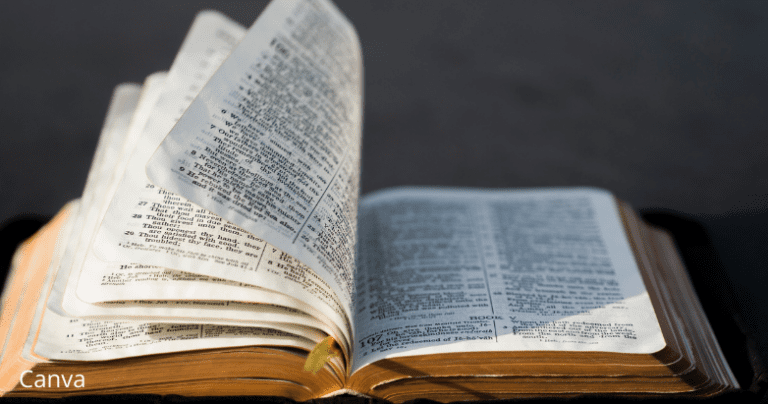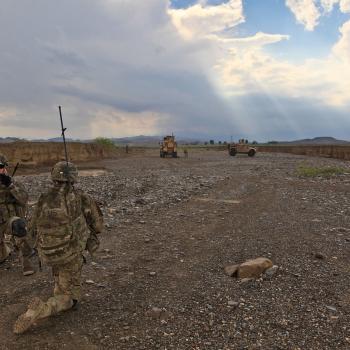
A devotional guide to the Gospel of Mark[1]
Week 2
Monday: Read Mark 6:33-56; 8:1-10
The reason for skipping over Mark 7, which you will read tomorrow, is that you may read the two feeding stories at the same time. As you read, make note of the comparisons. What things happen in both? What are the differences?
A careful reading of the feeding stories notes that there are several allusions to Moses’ leadership among the Israelites. Moses divided the people into hundreds, fifties, and tens (Exod 18:21, 25). Jesus’ multiplying the bread reminds us of the manna the Israelites ate each morning.
In addition, Mark notes that the people looked like “sheep without a shepherd” (6:34). This is a common OT depiction of a leader in Israel (especially a military one; see Num 27:17; 1 Kings 22:17; Ezek 34:12 [see especially 34:1-13]; Zech 10:2).
Questions to ponder/discuss:
- What do you think Mark wants his readers to know by depicting Jesus’ feeding the multitudes in accord with the description of Moses?
- Why does Jesus say, “you give them something to eat?” (6:37)
- Why does Jesus make extra bread?
- Why does Mark tell us that He made extra bread?
- Why does Mark tell us how many baskets they picked up?
Note: Don’t worry about the answers yet! Mark will help us answer these questions during Wednesday’s reading!
(If you want to “look ahead,” we will discuss this passage on the Determinetruth podcast which airs Jan 11, 2022).
Tuesday: Read Mark 7:1-37
Today’s reading is notably difficult to understand. We would do well to notice first is that it is the middle portion of a sandwich: that is, the two feeding accounts, which you read yesterday, make a sandwich with Mark 7 being the middle of the sandwich (the peanut butter and Jelly or the turkey and swiss if you will).
Corban was a traditional practice in which one would designate a portion of their money for temple service. Once done, this money could not be used for mundane matters: such as caring for elderly parents—the very thing the OT commands us to do! This means that the religious leaders were assisting people from violating the Torah (i.e., the OT law).
One significance of Mark 7 is that Jesus declares “all foods clean” (7:19). When Jesus asks, “are you so lacking in understanding?” (7:18), we are clued in that something greater than just what appears at face value is going on. It suggests that He has spoken parabolically (in parables): note, 7:17. What then is the significance of Jesus’ declaring all food clean? It means that they may eat with the Gentiles (i.e., the nations) and the Gentiles may eat with them! This will become vital for our study of the book of Acts and much of Paul’s writings (especially Galatians). Remember also that the early Christians ate together each week.
Note that the next story has Jesus in the region of Tyre (consult a Bible map, or even better a Bible dictionary, or do a google search on ancient Tyre), which is Gentile territory, and He speaks to a woman by referring to “bread” (8:27). Though the passage is indeed a bit difficult, the key here is that Jesus is not being rude. He is taking the Gospel to the “unclean.” (As far as the Jewish designations were concerned Gentiles were unclean. Also, note that she is the first person to understand a parable! 7:28)
If you would like a more complete explanation of the account of the Syrophoenician woman and Jesus you will want to read Ian Paul’s blog post on this passage.
Questions to ponder/discuss:
- What sort of religious things might you do that hinder our ability to keep the commandments?
Wednesday: Read Mark 8:11-39
Here we are confronted with the reality that Mark wanted us to ask, “why count the baskets of broken pieces they picked up?” Jesus even asks them! Mark ends this episode (8:21) with a question that he does not answer. We presume that he doesn’t answer it because he has discussed this with his readers in the past and they knew the answer! Of course, we do not know the answer—not without someone telling us. (Again, for a complete discussion of this passage and to learn the answer, see the Determinetruth podcast Jan 11, 2022).
The story of the healing of the blind man, which is critical for the outline of Mark’s gospel, is interesting (we will discuss the outline of Mark on the Determinetruth podcast on Jan 18, 2022.). The disciples were just asked, “do you not yet understand?” (8:21). In 8:17, they were asked, “do you not yet see or understand?” Then a blind man is healed. Coincidence? I think not. Note that the blind man is not healed completely. At least not at first. Could it be that the healing of the blind man in stages mimics the disciples’ understanding? That is, they understand only a little, but soon they will be able to “see” and “understand” everything.
Mark 8:27-38 is perhaps the center of the Gospel. For Mark, the question of what it means to be a disciple of Jesus is secondary only to his portrait of Jesus as the Son of God. There is no clearer definition of discipleship and what it entails than Mark 8:34-38. For Mark, discipleship includes projecting the Christian faith into a context of suffering and even death (8:34-38; 13:1-13). Mark writes to inform Christians undergoing persecution that Jesus taught that such persecutions would come; to encourage Christians in times of trouble and persecution by reminding them that Jesus also suffered, and to demonstrate that the purpose and mission of Jesus was to serve by His death (10:45)!
Putting these two key themes together (Jesus and discipleship) means that it is essential to know who Jesus is and what it means to be a disciple: namely, He is the King, and this requires taking up your cross and following Him (8:34-38). After all, if this was how Jesus was installed as king—namely, at the cross, then why would they expect to become kings differently? It is in this context that Jesus repeatedly states that He is going to Jerusalem to die (cf 8:31; 9:31; 10:32-34).
If we want to be His disciples, we must deny ourselves and take up our crosses and follow Him! (8:34).
Questions to ponder/discuss:
- Over the next few weeks memorize Mark 8:34-38.
- Do you understand? If not completely, be encouraged: neither did they. This is why the coming of the Spirit is vital for the Christian life. Ask the Spirit to help you understand! (Note: this is not a request for a miracle in that you don’t need to do anything. It means, keep up the good work and rely on the Spirit to continually strengthen you and increase your faith as you read and study)
- What might cross-bearing-love look like today in your context? (home, marriage, relationships, work, school, community)
- I would not hesitate to claim that learning to live a life characterized by cross-bearing-love is the key to Christian living. Make it a goal to regularly ask yourself: “did I demonstrate cross-bearing-love today?” How could I have done better in ‘x’ situation?
Thursday: Read Mark 9:1-29
Though Jesus explained clearly to His disciples who He is (8:27-33), this does not mean that they understood. They failed to understand that Jesus must die (8:31-32), and they definitely did not understand that Jesus must rise from the dead (9:9-13; cf 9:30-32; 10:32-34). The Transfiguration may well have served to demonstrate for them His identity. Even then, they may not have understood the significance of this until after the resurrection.
Mark’s version of the transfiguration of Christ—where Christ is shown in His glory—seems again to be modeled on Moses and Mt Sinai (cf Exod 24:16).
The disciples’ inability to cast out the demon demonstrates their continued failure to truly understand. Note that Jesus takes the boy by the hand and “raises” him (9:27). And that this event is sandwiched between Jesus’ two predictions of His own resurrection! (see: 9:9, 31).
Questions to ponder/discuss:
- Sometimes when we study the Gospels, we can get caught focusing too much on Jesus’ humanity and fail to recall His true glory. Perhaps, the best thing to do for today’s study is to stop and meditate (pray) on “our Father in Heaven; Holy is Your Name” (if you have time, read Isa 6:1-7 and Rev 4:1-11).
Friday: Read Mark 9:30-50
Again, the disciples fail to understand Jesus’ explicit statement that He was going to rise (we will discuss the Jewish view of resurrection when we read John 11).
The warning of Jesus in 9:38-50 is admittedly difficult. The first key is that Jesus is using “little ones” to refer to any of His followers and not just children (see 9:41). Secondly, Jesus is speaking hyperbolically (i.e., exaggeration). He is not asking them to maim themselves (as evidenced by the fact that this practice was not carried out by anyone in the early church).
Questions to ponder/discuss:
- The disciples’ difficulty in understanding what rising from the dead meant was in part because Jesus was not the kind of King they were looking for: they were certainly not looking for a king that would die-thus rising from the dead didn’t factor in. Too often we also reject truths because we don’t like them. We must remember that denying ourselves and taking up our crosses don’t really correspond too much to our likes. Discuss some examples of things you didn’t/don’t want to admit.
[1] This guide is meant to be done either as a group study over the course of 2 or 4 meetings (Day 1-5; 6-10; 11-15; 16-20) or as a private devotion over the course of 4 weeks (or a calendar month—5 lessons per week).
NB: My goal is to keep these posts free of charge. I do not intend to ever hide them behind a paywall. I can only do this if those of you who have been blessed by them and can afford to give ($5, $10, $25, or more/month) do so. You can give a tax-deductible contribution by following this link.
[1] This guide is meant to be done either as a group study over the course of 2 or 4 meetings (Day 1-5; 6-10; 11-15; 16-20) or as a private devotion over the course of 4 weeks (or a calendar month—5 lessons per week).
[2] It is very important to remember that the books of the Bible were initially “read” aloud by one person and “heard” by everyone else. Bibles were not read for private devotion by the common person until after the invention of the printing press in the 15th century. We would do well to “listen” to the Bible more!
[3] We will explain these accounts in an upcoming podcast. So, if you want to “understand,” then tune into the determinetruth podcast on Jan 18, 2022.
[4] Note that in Mark’s gospel it is the Scribes who are the primary antagonists to Jesus. Scribes were professional “lawyers”—meaning they were experts in the OT Law. The Scribes were not necessarily Pharisees. A Scribe is a profession and they may adhere to the beliefs of any of the “parties” within the first-century Jewish communities.
[5] Note that the cursing of the fig tree (11:12-14) is also the bottom piece of bread of another sandwich. The peanut butter and jelly is the havoc in the temple (11:15-19). The withered fig tree (11:20) is the top piece of bread!












